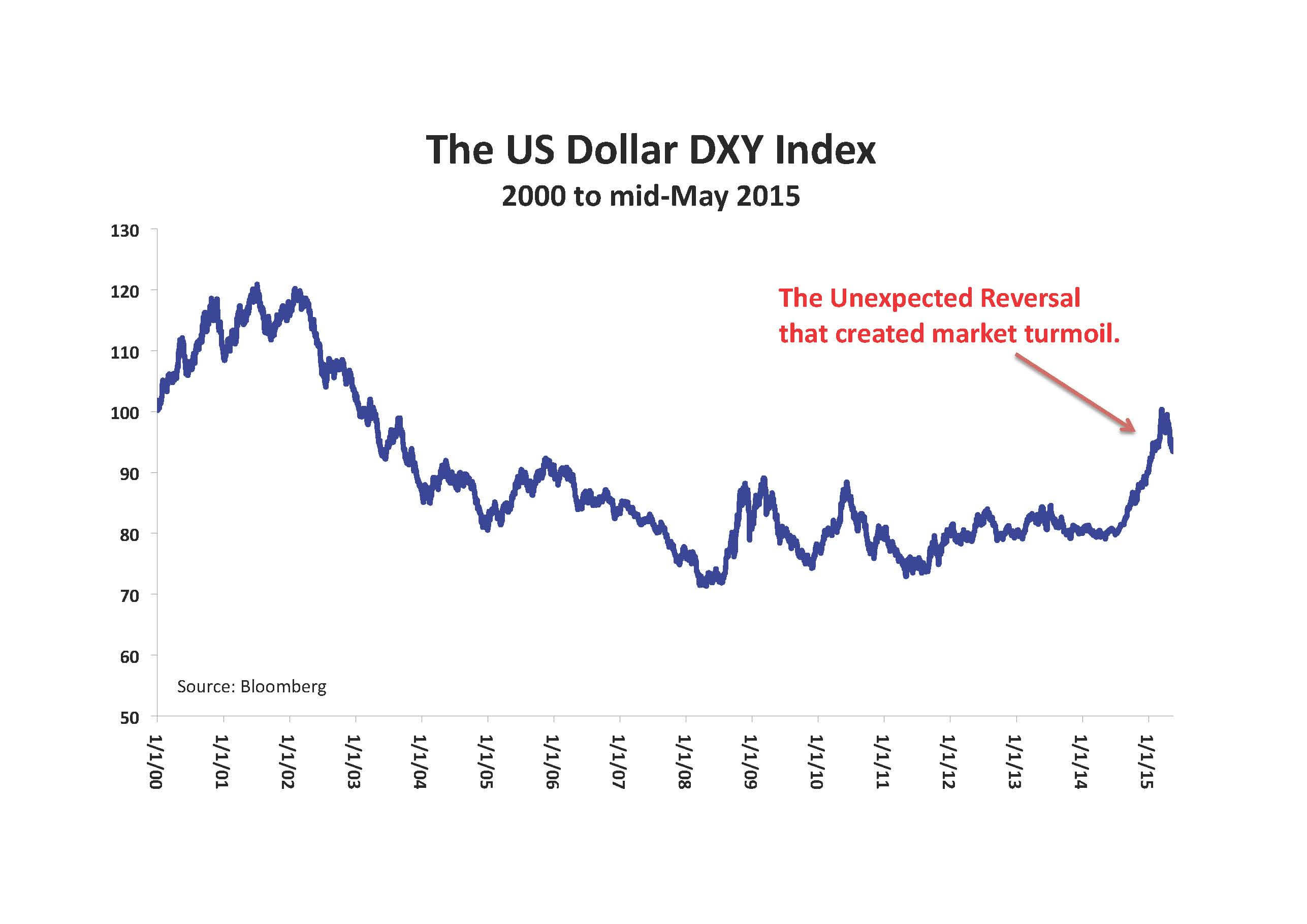Blog | Personal Finance
The Big Reversal
May 15, 2015
Everything that was going up is now going down. And everything that was going down is now going up. The global financial markets are experiencing a major, synchronized reversal across almost all asset classes. A shift like this does not happen often. Let’s consider what’s going on and why.
After falling sharply since mid-2014, commodity prices have bounced 11% since the middle of March (based on the Thomson Reuters CRB Index). Oil has led the way. West Texas Crude has risen 38% from its March 17th low of $43 per barrel. Copper is up 15%. Silver has risen 14%. And gold, at $1,220, is 8% higher.
The real action has been in the bond markets. The yield on the 10-Year US Treasury bond rose from 1.8% in early April to 2.36% a few days ago. The yield on 10-Year Japanese government bonds (JGBs) jumped from 0.2% in late January to 0.29% in late April to 0.45% now. The real fireworks were in the German Bund, however. The yield on the 10-Year German government bond hit a historic low of 0.05% on April 17th, then suddenly, in what some have called a “flash crash”, they shot up to 0.77% during this past week. That is an extraordinary move for bonds. Of course, bond prices move in the opposite direction to bond yields, meaning that a lot of people have lost a lot of money in the bond markets over the last month.
The stock markets in Europe, which had been moving up strongly since the European Central Bank announced its plans for a very aggressive Euro Quantitative Easing program, have also taken a hit. The German DAX, which had jumped nearly 50% between October and April, is now down 7% over the last month. The EuroStoxx 50 Index, which is comprised of a basket of European stocks, is down more than 6%.
So, what’s behind this synchronized reversal in commodities, bonds and the high-flying European equity markets? The US Dollar is. The Dollar had enjoyed a major rally since mid-2014, with the DXY Dollar Index up 25% between then and when it peaked on March 13th. Very aggressive fiat money creation in Europe and Japan pushed the Euro and the Yen down, while widely held expectations that the Fed would soon begin to hike US interest rates pushed the Dollar up. The strong consensus among financial market participates (i.e. the highly leveraged speculating community) was that the strong Dollar trend would continue. But, it didn’t. Starting in mid-April, it went into reverse. The Dollar Index (which measures the Dollar against a broad basket of currencies) has fallen 7% since then, while the Euro has gained nearly 9% against the Dollar.

The strong Dollar trend went into reverse because the US economy stopped growing. This was the year when the economic recovery in the United States was supposed to finally take hold. Hope springs eternal and Wall Street’s analysts and media cheerleaders are paid to make sure that it does. Unfortunately, 2015 is off to a terrible start. As I wrote in my last blog, “Off To A Roaring Stop”, it was announced at the end of April that first quarter GDP grew by only 0.2%. Incoming data since then makes it almost certain that the economy actually contracted during that quarter. Moreover, the rebound in economic activity, which Wall Street had anticipated for the second quarter, has yet to materialize. This weakness in the economy means it is very unlikely that the Fed will hike interest rates this year. When that realization sank in, the Dollar fell.
Regular readers of this blog will not be surprised that the US economy has stopped growing. Our post-Bretton Woods bubble economy requires either credit growth or Quantitative Easing to grow. Credit growth remains inadequate and QE 3 ended six and a half months ago. There is a real possibility that the United States will fall back into recession this year. If it does, the Fed will almost certainly launch QE 4. In fact, the Fed may launch QE 4 preemptively to keep the US out of recession. It is very important to keep an eye on the incoming economic data. If it continues to weaken, it won’t take the speculating community long to realize that QE 4 will soon be on the way. When they do, several of the “reversals” described above, in all probability, will reverse a great deal more.
If you are a subscriber to my video-newsletter, Macro Watch, log in and learn how the crisis in the global economy will affect you.
If not, join here:
http://www.richardduncaneconomics.com/product/macro-watch/
For a 50% subscription discount, hit the “Sign Up Now” tab and, when prompted, use the coupon code: richdad
You will find more than 15 hours of Macro Watch videos available to watch immediately. A new video will be added approximately every two weeks.
Original publish date:
May 15, 2015